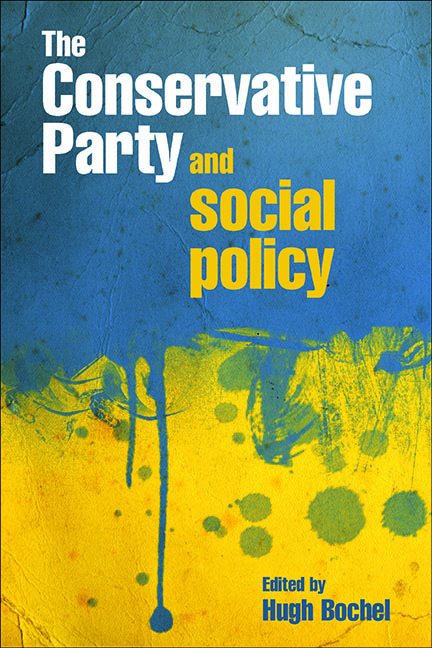Book contents
- Frontmatter
- Contents
- Notes on contributors
- one Conservative approaches to social policy since 1997
- two The Conservative Party and the welfare state since 1945
- three The Conservative Party and public expenditure
- four The Conservatives, social policy and public opinion
- five Conservative health policy: change, continuity and policy influence
- six Something old, something new: understanding Conservative education policy
- seven Conservative housing policy
- eight Social security and welfare reform
- nine A new welfare settlement? The Coalition government and welfare-to-work
- ten The Conservative Party and community care
- eleven Conservative policy and the family
- twelve Crime and criminal justice
- thirteen The Conservatives and social policy in the devolved administrations
- fourteen The Conservatives and the governance of social policy
- fifteen The Conservatives, Coalition and social policy
- References
nine - A new welfare settlement? The Coalition government and welfare-to-work
Published online by Cambridge University Press: 01 September 2022
- Frontmatter
- Contents
- Notes on contributors
- one Conservative approaches to social policy since 1997
- two The Conservative Party and the welfare state since 1945
- three The Conservative Party and public expenditure
- four The Conservatives, social policy and public opinion
- five Conservative health policy: change, continuity and policy influence
- six Something old, something new: understanding Conservative education policy
- seven Conservative housing policy
- eight Social security and welfare reform
- nine A new welfare settlement? The Coalition government and welfare-to-work
- ten The Conservative Party and community care
- eleven Conservative policy and the family
- twelve Crime and criminal justice
- thirteen The Conservatives and social policy in the devolved administrations
- fourteen The Conservatives and the governance of social policy
- fifteen The Conservatives, Coalition and social policy
- References
Summary
‘Change’ was the leitmotif of both the Conservative and Liberal Democrat campaigns in the general election of May 2010. The Conservatives urged the electorate to ‘vote for change’ and to sign up to a ‘contract for change’ (Conservative Party, 2010e), while the Liberal Democrats promised ‘change that works for you’ (Liberal Democrats, 2010). In the field of welfare reform, however, the opposition parties offered not change, but more of the same. As Lister and Bennett have noted, the Conservatives’ Work Programme, which was to become a central feature of the Coalition agreement between the two parties, did not ‘break out of the policy paradigm established by Labour’, but rather took it ‘further and faster in what has become a process of policy leapfrog’ (2010, p 102).
Television viewers were presented with the rhetorical equivalent of this policy leapfrog during the third of the prime ministerial debates. In this, Gordon Brown declared, ‘No life on the dole. That's my policy. We’ve got to get people off unemployment benefit and they’re going to be forced to work if they’ve been on benefit for a period of time.’ For his part, David Cameron promised that the Conservatives would ‘do everything we can to help’ people willing to accept work or training but that those who refused ‘should lose [their] entitlement to benefits for up to three years’. In direct response, Nick Clegg claimed that ‘we actually all agree with that. We agree that benefits should be conditioned [sic], we all agree that benefits shouldn't be just dished out for free if people refuse to take up work’ (BBC News, 2010a).
The ‘Sturm und Drang’ of electioneering is not, of course, conducive to a measured debate about the details of policy. Nor does this level of agreement offer any guarantee that the measures in question will have the effects envisaged. On the contrary, it makes it even more important that they be subject to independent scrutiny and analysis.
There are, then, three questions that need to be addressed in this chapter. First, what are the central features of the welfare-to-work programmes that were developed by New Labour and will now be expanded and intensified by the Coalition government? Second, what explains the apparent consensus around these programmes?
- Type
- Chapter
- Information
- The Conservative Party and Social Policy , pp. 161 - 180Publisher: Bristol University PressPrint publication year: 2011



